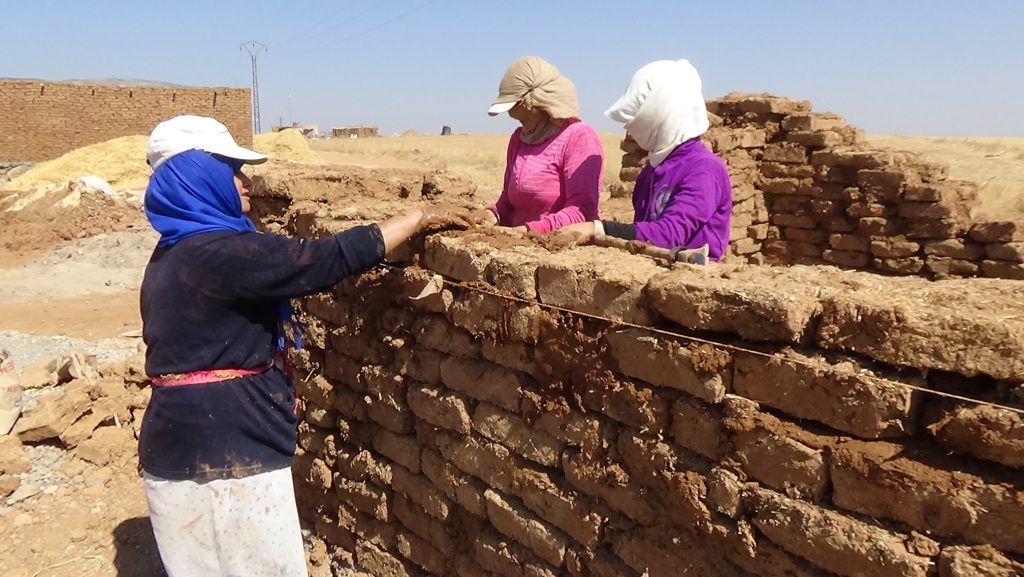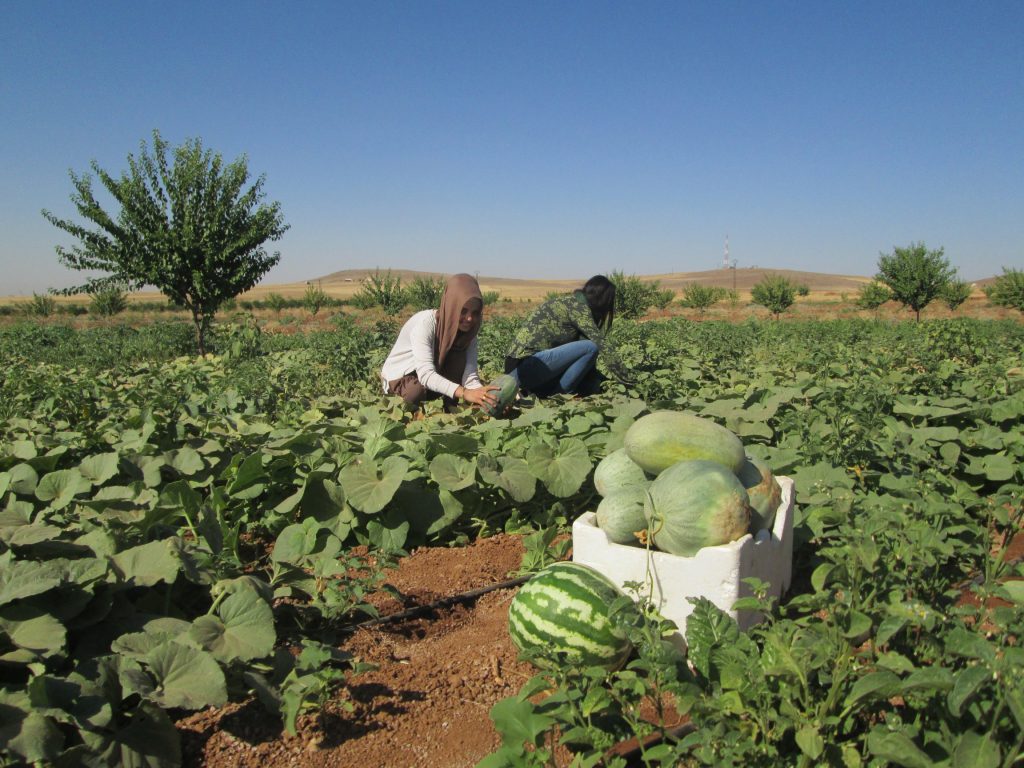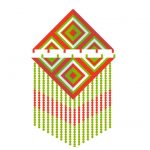On autonomous spaces, the connection of struggles and women’s revolution in Rojava
We came to Rojava as women and feminist internationalists, eager to learn from the Kurdish Women’s Movement, to live and to work with our Kurdish friends and comrades and to be part of the revolutionary process of building up and defending vivid alternatives of social organizing – here and elsewhere in this world. We want to share and discuss our experiences, this time we want to write about our reflections on Jinwar.
In between wheat fields a small village is being built up. The houses are made of mud in the traditional and most sustainable way, just as they have been built here in the region for thousands of years. The newly planted garden makes a change in the landscape; little fruit trees, olive trees, tomato plants, cucumber, watermelon, paprika, aubergine and a lot of wildly growing parpar (portulac) all around, needing just a little water and earth to grow without ever consciously being planted. Women work with their bare hands in the mud, creating bricks with which they will build up the houses of this village. The village is called Jinwar, and it will be a women’s village.
‘Jin’ itself is a meaningful expression in the Kurdish language: It means ‘woman’ but at the same time it is close to the word ‘jîn’ which means ‘life’. The Kurdish word ‘war’ means ‘space’, ‘land’, ‘home’. Jinwar will become a women’s space, a space where women will gather, live and work together, based on the vision of a free and communal life. It is a pioneering project that is deeply attached to the three basic principles of the democratic confederalist paradigm: democracy, ecology and women’s liberation.
In the last years the women in Rojava/Northern Syria have built up a base of self-organization in all areas of society that inspires women all over the world. Still women are facing a lot of difficulties while struggling for an autonomous life. Breaking away from patriarchal structures is challenging, here as everywhere. Patriarchal family structures have a big influence and the majority of women only have the option to leave their parents’ home when they get married. Women who decide to give up the traditional family cycle often join the women’s self-defence forces, such as the YPJ, dedicating their lives to defend the revolution and the people. The project of Jinwar is looking to open another space to live a free life based on women-centered ethics and values. It is a space of women who do not want to marry but are looking for an autonomous life; it is a space of women who have lost their husbands and other relatives in the war or who do not have a proper place to stay with their children. It is as well a space for women who have experienced violence – due to war or other patriarchal oppression – and want to break free from that. Indeed Jinwar teaches us to see the revolution from a holistic perspective. The women that struggle with rifles in their hands and the women that work with their hands full of mud are part of the same revolution, struggling on different fronts for the same vision of a free society.

The idea to create a womens village in Rojava has been a dream of women in the women’s movement for many years. One year ago several women and autonomous women’s organizations finally gathered and founded a committee for the creation of Jinwar. Afterwards half a year was spent on discussions, planning and making infrastructural preparations. This process lead to the start of the practical construction of the village in the beginning of spring 2017. Apart from thirty houses for living and the communal gardening project, there will a school for children, a womens academy (where knowledge in all the fields of Jineoloji will be gathered, shared and connected to practice), a center of culture and arts and a place of health care, focusing on natural medicine. The social life forms the center of the village and this understanding should be reflected in Jinwar’s architecture
and infrastructure. As Jinwar will be organized as a commune, the center of the village will be shaped by the place of the assemblies, as well as a tea garden and other places to meet, to live and to work together.

With the planting of the communal garden the women are aiming to create a base of self-sufficiency for the village, but also to maintain the connection to the earth and the food which nourishes as a fundamental part of life. In an area of quasi-desert and wheat mono-culture, being result of the Syrian regimes policy to industrialize agriculture since the 1970s, as well as the Turkish states warfare against the Rojava region (aiming to dry it out slowly by cutting off its water supplies), growing a big ecological garden and an orchard of fruit trees itself is an act of vivid resistance. It will change the territory, revive the ground and create an example of how a commune can live and work with the land in a sustainable way.
[su_quote cite=”Abdullah Öcalan”]Women can never be free if they do not disconnect themselves from men and the patriarchal system in every aspect: mentally, physically and emotionally.[/su_quote]
The village will be an autonomous space, a space of women to live freely and to regain the confidence, strength and creativity that have been undermined in the long historical process of an ever deeper and broader systematization of state, capitalism and patriarchy. Such an autonomous space can become a space to breathe, a space to overcome the destructive influence of the patriarchal system and to develop and practice a liberating approach towards life together. This actually applies an idea which Abdullah Ocalan calls theory of separation: Women can never be free if they do not disconnect themselves from men and the patriarchal system in every aspect: mentally, physically and emotionally. Consequently, only free and emancipated women, having a strong and meaningful base apart from patriarchal structures of power and oppression, can push men as well to challenge their privilege, their oppressiveness and oppression within the patriarchal structures and call them to take their responsibility in the struggle for gender liberation. For changing society we need spaces and structures of organizing ourselves. Jinwar can be one of these autonomous spaces a safe space and a brave space, a space of regaining and deepening knowledge and confidence without a patriarchal eye evaluating every move one makes. A space to connect the life of women today with the heritage of womens culture and wisdom of all times. A space of practicing alternative forms of communal living and working, reflecting on them, developing them further and defending them together.
Indeed Jinwar is a place where the socio-political ideals of the Rojava revolution, known as being a women’s revolution, can be realized in a small scale. Still Jinwar does not make the mistake to see itself as a closed community, aiming to realize a whole big social vision in a locked up space. The women of Jinwar see themselves as part of the revolution, being connected in the growing vision of democratic confederalism, sharing common ethical principles and basic methods of social organizing. As a women’s commune Jinwar will be part of the network of communes, cooperatives and councils organizing under the umbrella of Kongreya Star. In this way the autonomous women’s spaces and structures are connected to each other, being able to organize according to their needs. Furthermore there is a lot of exchange with the people from the villages around and women from different cantons and even countries come to join in the work and discussion.
[su_pullquote align=”right”]Jineoloji seeks to formulate alternatives in all fields of society and bring them to live – namely in the fields of ethics/aesthetics, economy, demography, ecology, history, health, education and politics. [/su_pullquote]Another fundamental base of connection is Jineoloji, the alternative social science of women that will be practiced, shared and developed further in Jinwar as well. Jineoloji seeks to build a base of knowledge, common consciousness and understanding of life that deeply differs from the patriarchal system. In contrast to most of the knowledge emerging from western institutions of science, Jineoloji is not cut off society and perceives knowledge and truth as something that goes together with the practice of an ethical life. Based on the rich history of women’s knowledge and resistance in all times of history, Jineoloji seeks to formulate alternatives in all fields of society and bring them to live – namely in the fields of ethics/aesthetics, economy, demography, ecology, history, health, education and politics. These fields are no abstract categories, but they are all connected to a broader understanding and social practice. If there will be an education on economy and ecology in Jinwar, it will be connected to the reflection of the practice in the communal gardens and the network of cooperatives. If the topic is politics, the central question is how people interact with each other and how problems can be solved and decisions can be taken – be it in a womens commune, in a village council or on the level of the whole society. Jineoloji has been developed by the Kurdish Womens Movement, but it is being more and more discussed in other parts of the world, inspiring women and feminists from different backgrounds and bringing them together. In all these ways the experiences that are made in Jinwar can be given back to the whole society, becoming part of the transformation process towards a free and ethical society.
[su_pullquote]You deal with these contradictions, you see them with all their roots and layers, you do not avoid conflicts and every day you find solutions together. [/su_pullquote]
Another impressive aspect about Jinwar: the absence of fear to deal with the contradictions and difficulties a revolutionary social process brings about. The struggle with patriarchal mentalities starts already in the planning and construction of the village. What do you do if you are about to build a wall out of kerpîç stones with a group of experienced women, but the first man passing by takes the stones out of your hand with the attitude of an expert, even if he has no idea of kerpîç work? What do you do if a gender mixed group comes to help with the work for the first time, but only the men appear for the collective lunch, because tradition says that women and men do not eat together, so it is not the men but the women who will stay in their place to eat the rests afterwards? What we can learn from the women of the Jinwar Committee is: You deal with these contradictions, you see them with all their roots and layers, you do not avoid conflicts and every day you find solutions together. You remain clear in your ideals and your connection to each other, without losing your openness and ability to deal with the problems you are facing in every days reality. An attitude which is based on commitment, a deep connection to people and society, common ethics, patience, a clear focus and a shared vision. It is based as well on frequent meetings of the committee for collective reflection, critique and self-critique. And it is based on the connection to the growing structures and vision of democratic confederalism, with women’s liberation as a common base for that women have fought a lot. Jinwar will not become a small utopia without mistakes, but it can become a place of honest interaction, hope, the will to change and to practice and defend a meaningful communal life. This needs a lot of commitment, love and effort.
If you recognize all this and become part of it, it is unbearable to witness that the revolution and its values are under attack every day. There are attacks driven by deeply patriarchal and fascist mentalities, aiming to erase the revolutionary gainings and control womens strength and resistance; and there are attacks through the liberal forces of capitalist modernity, tending to slowly undermine the revolutionary ethic and substance. Always finding the right way of defense against these attacks is for sure not easy, but it is projects like Jinwar that let us know that there is a way and that we have to live and defend the social vision and the strong kernel of hope and vivid resistance that lives in them. Jinwar is one of the representations of the global resistance and creation of alternatives, connected to all those who are struggling against patriarchal structures and mindsets; to those who have the will to live and defend a meaningful revolutionary life, culture and ethics. The struggle is the same. It is our aim to make this connection real, to learn from the experiences our friends make here, to join in the revolution and to connect, support, defend each other on a common base.
Jin Jiyan Azadi!
[su_box title=”Jinwar”] Contact information
Contact information
Email: [email protected]
Website: http:///jinwar.org
Facebook: https://www.facebook.com/jinwarwomensvillage/
Kurdish facebook: https://www.facebook.com/Gundê-Jinwar-1043789715756805/
[/su_box]